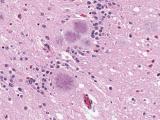Sep 24, 2004 (CIDRAP News) – United Kingdom health officials this week began telling several thousand Britons they may face a slightly increased risk of contracting variant Creutzfeldt-Jakob disease (vCJD) because they received blood products from donors who later were found to have the disease.
About 6,000 people who have hemophilia and other bleeding disorders and a few people with primary immunodeficiency or certain other conditions were to be informed of the situation, the UK Department of Health (UKDH) said in a Sep 21 news release.
"Although any additional risk to these people is likely to be very small, it is necessary to take some simple steps to minimize any chance of passing on the infection," the statement said. "These steps include not donating blood, tissue or organs, and ensuring that they tell their doctors and dentists if they undergo treatment in the future."
Variant CJD is the human form of bovine spongiform encephalopathy, or mad cow disease, which spread through British cattle herds in the 1980s and 1990s. Nearly 150 people in Britain have suffered the fatal brain disease. It has been generally believed that these cases all resulted from eating beef products from diseased cattle.
However, two cases of suspected bloodborne transmission of vCJD in Britain have been reported in the past year, one last December and one in July. These cases and related investigations prompted the decision to inform blood-product recipients of a possible increased risk.
So far, nine British donors of blood plasma are known to have contracted vCJD, according to a report by the UKDH's Health Protection Agency (HPA) in the Sep 23 issue of Eurosurveillance Weekly. Those donors made a total of 23 plasma donations, which were used in making a variety of blood products, the report says.
People who received transfusions of whole blood from donors who later were found to have vCJD were contacted earlier this year and told about their possible additional risk, according to the UKDH news release. Since then, the department has traced plasma from the donors and conducted a risk assessment, which led to the decision to notify recipients of the blood products, officials said.
People considered to be at risk are being contacted directly by their doctors, officials said. Health Secretary John Reid stated, "We have . . . been concerned to do everything practicable to ensure the patients directly affected are informed by the specialist doctors who care for them, so they can be given all appropriate information and support. I know this information may be difficult to absorb, which is why we are working with their doctors and other clinicians, to ensure they have the information and support they need."
The UKDH said it won't know exactly how many people will be notified until patient records have been examined, a task that was begun Sep 9.
The department said about 6,000 people with hemophilia and other bleeding disorders would receive letters about the situation, but "the number who may be affected directly is estimated to be around 4,000 people."
Others to be contacted include an estimated 50 people who have primary immunodeficiency and a few people "who have been treated with large quantities of particular plasma products for a range of conditions," such as secondary immunodeficiency," the UKDH said.
A statement on the HPA Web site says physicians will trace and assess the recipients of implicated plasma products to determine if the patients have a high enough risk of contracting vCJD to warrant public health precautions. When precautions are warranted, physicians will take steps to ensure that patients don't donate blood, tissue, or organs and that, if the patients undergo surgery, extra infection control steps are taken.
UKDH statements describe the risk to the blood product recipients as unknown but probably very low. The news release said that plasma products are made from "pools of many thousands of donations, greatly reducing any risk of vCJD being passed on."
Reid said the government's handling of vCJD and possible bloodborne transmission has been guided by the principles of "maximum caution and maximum openness."
See also:
Report in Sep 23 Eurosurveillance Weekly
http://www.eurosurveillance.org/ViewArticle.aspx?ArticleId=2552
UK Health Protection Agency report "Variant CJD and Blood Products"
http://www.hpa.org.uk/infections/topics_az/cjd/blood_products.htm














